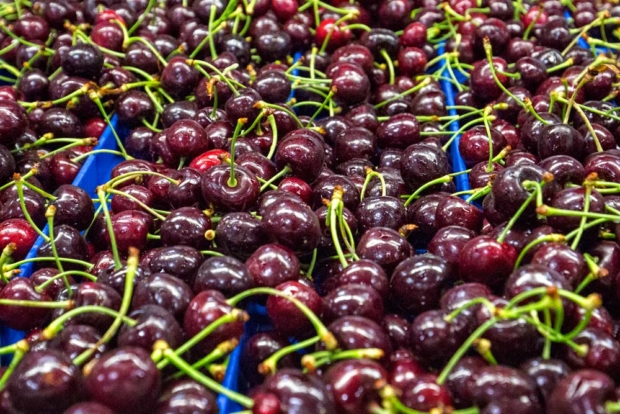
Freshly washed cherries roll through the packing process at Blue Bird, Inc.’s, Wenatchee, Washington facility on June 16, 2017. (TJ Mullinax/Good Fruit Grower)
Northwest cherry growers produced a record crop this season, but they’ll be looking for ways in the offseason to improve fruit size and quality next year following complaints that some of the fruit didn’t meet the industry’s usual high standards.
Beyond the obvious cause — overset trees with too many cherries — growers and shippers are scratching their heads to nail down all of the factors that led to so much small fruit that lacked sugar and firmness in Washington, the region’s biggest player. The problems varied by growing region and variety. More examination is expected into the roles high temperatures, nutrition and horticultural practices, such as lack of pruning or thinning or picking fruit too early, either as a preemptive move to avoid a heat wave or to hit a high market and get a better price, may have played.
“In general, it was a year that a lot of fruit probably didn’t meet the standard that we want to meet in terms of firmness and size,” Tate Mathison of Stemilt Growers said at the Washington State Fruit Commission board meeting Thursday. “Repeat purchase is all about quality.”
As of Thursday, the West Coast had shipped 33.5 million 20-pound boxes of sweet cherries. That includes a record 8.7 million boxes from California, and about 25 million boxes from the five-state region that comprises the Northwest Cherry Growers group: Washington, Oregon, Idaho, Utah and Montana, with estimates of up to another 2 million boxes still to be shipped, said B.J. Thurlby, president of Yakima, Washington-based Northwest Cherry Growers.
The previous record crop for the Northwest was 23.2 million boxes in 2014.
A significant amount more 11-row fruit shipped to retailers in the month of June compared to 2016. That continued into July, but a number of growers were told by packers before the July 4 holiday that their smaller fruit wouldn’t be packed, Thurlby said.
The reason: There was just too much small fruit coming into the warehouses.
One topic likely to come up during winter meetings is the idea of a brix standard for sweet red cherries, which might also discourage growers from picking cherries too early, before they have fully ripened.
“It’s when the market is super high, there’s an incentive to pick it early. It might put a little leash on people,” said Doug Pauly of Northern Fruit Co. in East Wenatchee, Washington.
The reality is that it was a tough year for growers, grower Joe Wiggs said, noting that he had 9-row fruit growing right next to 13-row fruit in the same clusters. “What can I do about that?” he asked.
Regardless, “There’s going to be a lot of revenge pruning this winter,” he said.






Leave A Comment